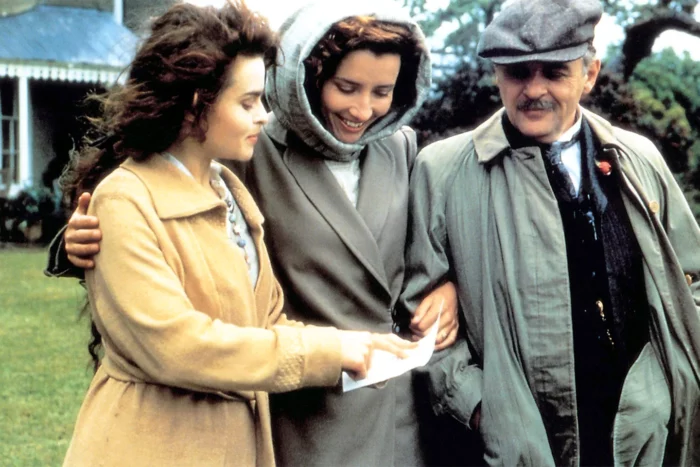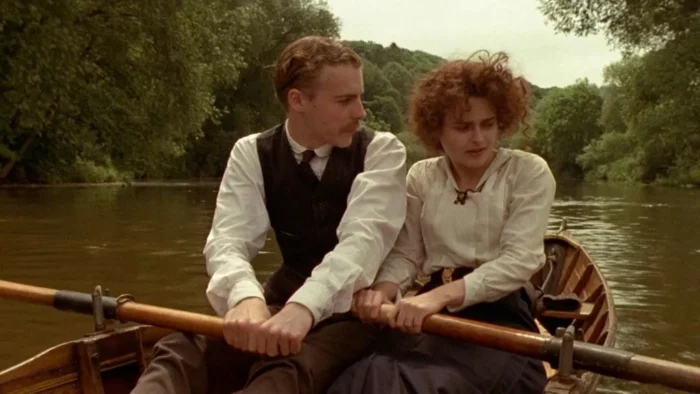
The 65th Academy Awards (1993)
Nominations: 9
Wins: 3
For a brief period in the late ’80s and early ’90s, it seemed like the films produced by Ismael Merchant and directed by James Ivory were a bit of an Oscars juggernaut. Granted, none of these movies ever won Best Picture, and they only occasionally get talked about nowadays, usually as an obligatory example of a staid British period piece. But they seemed important at the time, even if they haven’t remained all that accessible. So I’ve had a vague interest in watching at least one of these movies, and the best place to start seemed to be Howards End, which is probably the most acclaimed of the Merchant-Ivory productions. Luckily it turned out to be pretty compelling and full of ideas that still ring true, even if it may appear a bit stuffy on the surface.
Based on the 1910 novel by E.M. Foster, Howards End tells the story of three different families from the main three different social classes — the wealthy, the middle class, and the poor. The wealthy family is the Wilcoxes, who first become entangled with the middle-class Schlegels when Helen Schlegel (played by Helena Bonham Carter) becomes engaged to Paul Wilcox (Joseph Bennett), though they ultimately break off the engagement. The Schlegels and Wilcoxes then connect several months later when the Wilcoxes are staying in London across from the Schlegels’ flat. Helen’s sister Margaret (Emma Thompson) strikes up a friendship with the lonely Ruth Wilcox (Vanessa Redgrave) who is married to the no-nonsense businessman Henry (Anthony Hopkins).
Not too long after Margaret and Ruth become friends, Ruth’s health starts to deteriorate, and in a hand-written will she leaves her beloved estate, Howards End, to Margaret. However, because her greedy family members (including her husband Henry) are the ones to discover this will, they burn it and never speak to anyone about it. Shortly after this, Henry starts to get closer to Margaret, and feeling lonely after his wife’s death, proposes that they marry, which they eventually do. While all this is happening, the Schlegel’s befriend a working-class clerk named Leonard Bast (Samuel West), who has a wife of dubious reputation, and who receives some ill-informed career advice from Henry to find another job. He follows the advice, but ultimately this leads him into further poverty.
While Margaret is living the good life after marrying into the wealthier Wilcox family, her sister Helen becomes smitten with Leonard, and the two of them have a bit of an affair. Helen’s mental health then slowly starts to deteriorate, which concerns Margaret, who ultimately invites her to come live at Howards End. However, things come to a head when Leonard Bast and his wife come to a social gathering at the estate and get drunk. Henry, meanwhile, can’t stand the sight of them, while Margaret can’t help but point out how similar his and Leonard’s flaws are, though Henry still feels superior to Leonard just because he has money.
I don’t know if any of that was interesting to read about, since the drama between these characters is fairly subtle, but also very stirring in the context of this movie. There’s also just a lot of characters and storylines in this film that I probably didn’t even mention, but that’s what makes this feel like such a good literary adaptation, even coming from someone like myself who hasn’t read the book it’s based on. But you can tell that a lot of attention was paid to remaining faithful to the source material, while also keeping what is dramatically satisfying and not whatever minutiae that’s more suited for the literary medium. It’s no surprise that Ruth Prawer Jhabvala’s script was one of the handful of Oscar categories that Howards End won in 1992, as it feels like a great example of how you bring a classic novel to the screen while making it conform nicely to the constraints of a movie.
I also think that the script (and the movie as a whole) does a nice job of commenting on British class disparities in a way that’s pretty easy to wrap your mind around. Henry, the Anthony Hopkins character, is quite easy to label as a villain, while Leonard, the downtrodden working-class hero is easy to root for. Meanwhile, Margaret and Helen are caught between these two opposing men and their various flaws and charms. Now, when you lay things out like that, the movie sounds a little on-the-nose, but quite conversely, the relationships are so nuanced that you rarely think about what broad strokes the movie is painting with in terms of plot and metaphors.
I suppose if there was one thing that kept me from completely loving this movie, it’s that James Ivory’s direction isn’t quite messy enough for me. While I’ll admit that there are plenty of striking visuals and use of camera in unconventional ways, I’m not sure if there is enough inventiveness here from a filmmaking standpoint to really break Howards End out of its tidy British period piece box. That said, I do like the scope of this movie, as it takes place both in the country of the comfortable wealthy, but also in the cobblestoned streets of Edwardian London, when most period pieces of this nature just give you one or the other. Also, the performances that Ivory gets out of these actors are all top-notch, and while Emma Thompson received a Best Actress Oscar for her turn as Margaret, really all of the actors (including the less well-known Samuel West) could have been Oscar contenders.
Seeing as I liked Howards End overall, does that mean I’m going to check out more Merchant-Ivory movies? I can’t say I’m in a hurry to, since this certainly wasn’t the kind of movie that you can just put on and have playing in the background. That said, it certainly makes these films feel a bit more approachable, so I could see myself watching either A Room With A View (another Best Picture nominee starring Helena Bonham Carter) or The Remains of the Day (another Best Picture nominee that just a year later saw Anthony Hopkins and Emma Thompson reteaming). Will they be Oscars Fortnight picks next year? Possibly, but if I learned anything from watching this movie, it’s that it’s worth diving into films and filmmakers you’re not all that familiar with, since they might not be as dry and boring as you’d always assumed.


